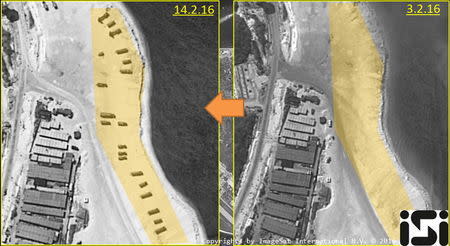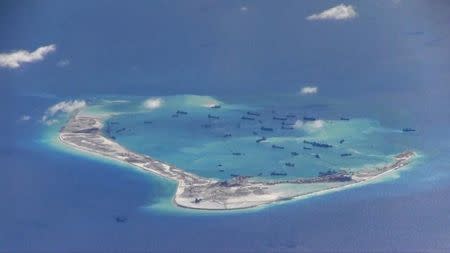U.S. accuses China of raising tensions with apparent missile deployment
By David Brunnstrom and Ben Blanchard
WASHINGTON/BEIJING (Reuters) - The United States accused China on Thursday of raising tensions in the South China Sea by its apparent deployment of surface-to-air missiles on a disputed island.
U.S. State Department spokesman John Kirby said commercial satellite imagery suggested "very recent" placement of missiles on Woody Island in the Paracel island chain that went against China's pledge not to militarize the South China Sea.
"The Chinese have said one thing, and yet appear to be doing another," Kirby told a regular news briefing.
"We see no indication that ... this militarization effort, has stopped. And it's doing nothing ... to make the situation there more stable and more secure. In fact, it's having quite the opposite effect."
On Wednesday, U.S. Secretary of State John Kerry said the United States would have "very serious" talks with China about militarization of the South China Sea.
China has offered little specific response to the missile deployment reports, which first appeared on Fox News on Tuesday, but has accused Western media of "hyping up" the story and said China had a legitimate right to military facilities on territory it views as its own.
China claims most of the South China Sea, through which more than $5 trillion in global trade passes every year. Vietnam, Malaysia, Brunei, the Philippines and Taiwan have rival claims.
Australian Foreign Minister Julie Bishop, the first senior Western official to visit China since the reports appeared, said she raised the issue of the South China Sea's militarization in talks in Beijing on Thursday.
She told reporters after meeting China's top diplomat, State Councillor Yang Jiechi, that China had "challenged" the deployment report but had neither denied nor admitted the missiles were there.
"So until such time as we have a clear picture of it, of course it's a matter of concern," she said.
Bishop referred to comments by Chinese President Xi Jinping in Washington last year that China did not intend to militarize islands in the South China Sea, and added: "We certainly hold China to that and that's been reiterated to me."
'LIMITED DEFENSIVE FACILITIES'
Yang explained that the islands in the South China Sea had been China's since ancient times and that "the limited defensive facilities that China has deployed on its own territory have nothing do with militarization," a Chinese statement said.
Yang added that Australia should stick to its promise not to take sides and "not participate in or take any actions to harm regional peace and stability or Sino-Australia ties."
On Friday, Chinese Foreign Ministry spokesman Hong Lei said China was not militarising the Spratly Islands and criticised U.S. air and naval patrols in the region.
"These actions have increased tensions in the South China Sea and constitute the militarization of the South China Sea," Hong told a regular briefing, when asked about Kirby's remarks.
The United States claims no territory in the South China Sea but has expressed serious concerns about how China's increasingly assertive pursuit of territorial claims there could affect the vital global trade routes that pass though it.
Beijing has been angered by air and sea patrols the United States has conducted near islands China claims in the South China Sea. Those have included one by two B-52 strategic bombers in November and by a U.S. Navy destroyer that sailed within 12 nautical miles of Triton Island in the Paracels last month.
An influential Chinese state-run tabloid, the Global Times, said in an editorial on Thursday that China needed to strengthen its "self-defence" in the South China Sea in the face of "more frequent provocations from the U.S. military."
"Jet fighters from the United States, an outside country, may feel uneasy when making provocative flights in the region. To us, that's a proper result," it said of the reported missile deployment.
(Reporting by Ben Blanchard and Michael Martina in Beijing and David Brunnstrom in Washington; Editing by Peter Cooney and Clarence Fernandez)





